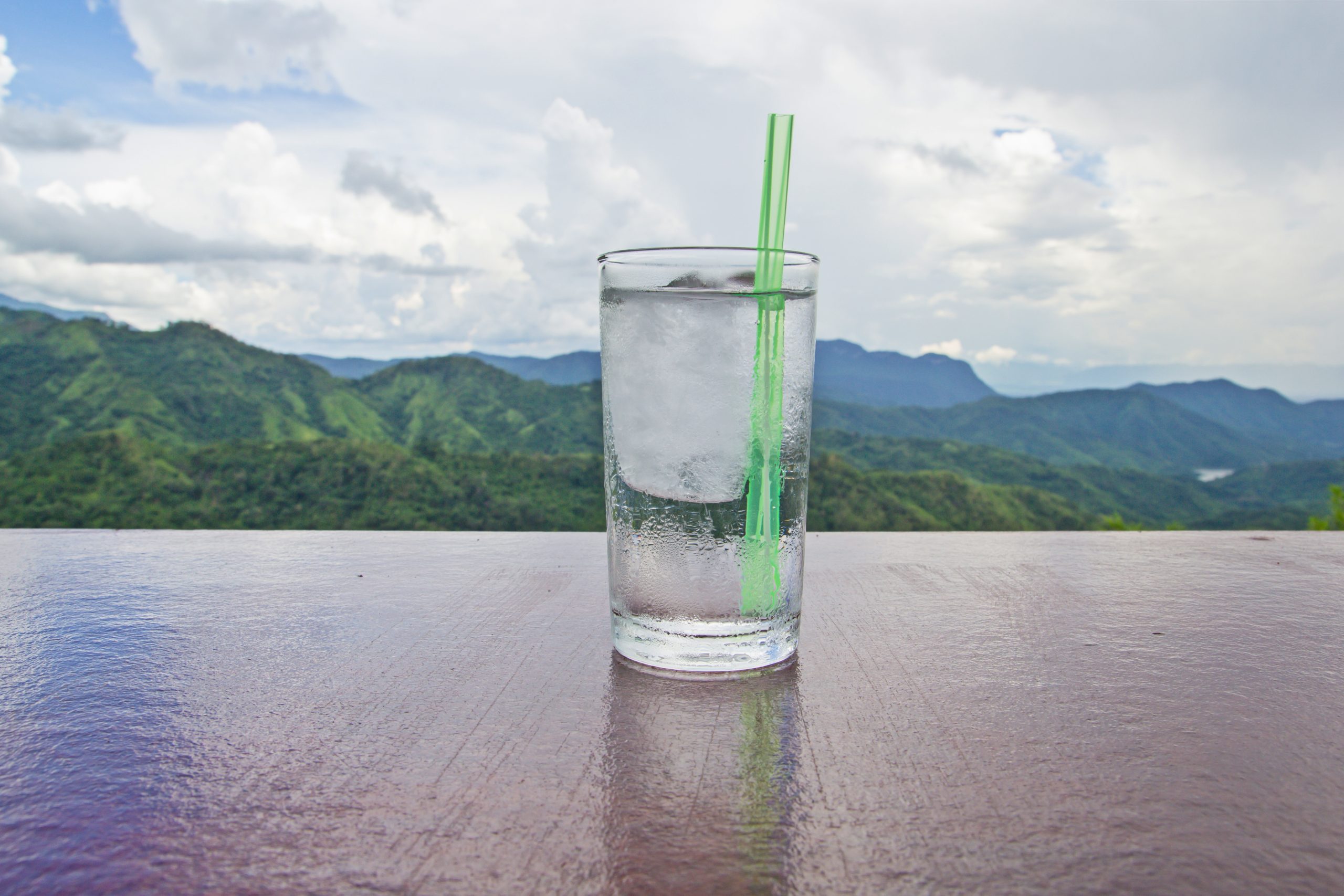We’ve all heard the suggestion to drink 8 glasses of water a day because water is good for you. To put it simply, our body needs water in order to function properly since 60% of our body is water! As studies suggest, staying hydrated can improve your productivity, mood, memory, energy level, and clarity. So what is the big hype about alkaline water? The idea that alkaline water is medicinal, curative, and able to bring about optimal health seems to be based on the belief that acidic properties in the body and blood are the cause of ill health and disease and need to be neutralized. Therefore, a more alkaline body will lead to better health.
What is Alkaline water?
Alkaline water has a higher PH level then regular drinking water. The pH level is a scale and the lower the PH the more acidic it is. High concentrations of hydrogen ions yield a low pH (acidic substances), whereas low levels of hydrogen ions result in a high pH (basic substances).
The pH scale ranges from 0 to 14. Anything below 7 (ranging from 0 to 6.9) is acidic, and anything above 7 (ranging from 7.1 to 14) is basic. The blood in your veins is slightly basic (pH = 7.4), whereas soap (pH = 12) and bleach (pH = 13) are highly basic. On the other hand, coffee is slightly acidic (pH = 5) and tomato juice (pH = 4) and lemon juice (pH = 2) are highly acidic.
Alkaline compounds (alkali) are substances, like salts, metals, and minerals, that, when added to water, make it more basic. Water always contains some amount of dissolved solids including minerals like calcium, magnesium, potassium, and sodium, but alkaline water tends to have a higher amount of total dissolved solids, which increases its pH level. Regular drinking water is typically neutral with a pH level of 7 and alkaline water is slightly basic with a pH level of about 8 or 9.
Alkaline water contains four major minerals that contribute to its remarkable health benefits:
- Calcium: Important for bone health, as well as heart, muscle, and nerve function.
- Magnesium: Helps turn food into energy and is necessary for over 300 biochemical reactions in the body.
- Sodium: Regulates blood pressure and volume, and supports nerve/muscle function.
- Potassium: A type of electrolyte that is essential for muscle function and promotes healthy digestion.
The claims that Alkaline water is beneficial to one’s health is controversial in that some claims lack proven scientific research. But those that have been scientifically proven are:
Improve Bone Health
Some research has been done on the effects of alkaline intake on bones. A study published in the scientific journal Bone found a positive effect on bone resorption with people who consumed alkaline water rich in bicarbonate. Bone resorption is the process where old bone cells are broken down and replaced by new ones. Less bone resorption and more mineral density resulted in better bone strength. The authors of the study concluded that “a bicarbonate- and calcium-rich alkali mineral water decreased bone resorption more than a calcium-rich acidic mineral water.”
Soothe Acid Reflux
A study published in Annals of Otology, Rhinology & Laryngology found that drinking alkaline water at pH 8.8 can help soothe acid reflux because the higher pH level kills pepsin, an enzyme involved in breaking down food proteins and a main cause for acid reflux. Acid reflux is when the contents of the stomach, which are acidic, splash back up the food pipe. Acid reflux that keeps happening for a long time can cause damage and a disease known as gastroesophageal reflux disease, or GERD.
Reduce High Blood Pressure, Blood Sugar, and Cholesterol
In 2016, scientists in Shanghai found that three to six months after drinking alkaline water, people with high blood pressure (hypertension), high blood sugar (diabetes), and high blood lipids (cholesterol) had lower measures in each of these factors. Researchers found that a high-pH electrolyte water reduced the thickness and stickiness of your blood, in 100 adults after exercising. This may help reduce cardiovascular strain due to dehydration.
Enhance Hydration
A 2017 study published in Biology of Sport found that drinking alkaline water shows a positive effect on hydration status after anaerobic exercise with a significant decrease of specific urine gravity. Intake of alkaline water also shows a positive effect on urine pH during the anaerobic test protocol, and much more efficient lactate utilization after the high-intensity interval exercise. In addition to enhanced hydration, efficient lactate utilization results in increased energy, as lactate serves as an energy source in skeletal muscles.
In contrast, subjects who consumed regular drinking water showed no changes over the same period of time. These results indicate that the habitual consumption of alkaline water may be a valuable nutritional vector influencing both acid-base balance and hydration status, as well as energy levels in active healthy adults.
Increase Longevity
A study published in 2016 looked at the effect of consuming alkaline water on 150 mice over a period of three years. Results suggested that those who drank alkaline water had signs of greater longevity, in other words, they aged less and were more likely to live longer. Histological examination of mice kidneys, intestines, hearts, livers, and brains was performed in order to verify the risk of diseases correlated to drinking alkaline water. No significant damage, but aging changes, emerged; organs of alkaline watered animals resulted to be relatively superimposable to controls, shedding a further light on the benefits of alkaline water consumption in humans.
https://quenchwater.com/blog/what-is-alkaline-water
https://www.usgs.gov/special-topic/water-science-school/science/ph-and-water?qt-science_center_objects=0#qt-science_center_objects
https://www.sciencebuddies.org/science-fair-projects/references/acids-bases-the-ph-scale
https://sciencing.com/alkaline-vs-basic-6132782.html
https://www.merriam-webster.com/dictionary/alkali
https://www.nof.org/patients/treatment/calciumvitamin-d/
https://ods.od.nih.gov/factsheets/Magnesium-HealthProfessional/
https://medlineplus.gov/ency/article/002415.htm
https://medlineplus.gov/potassium.html
https://www.sciencedirect.com/science/article/abs/pii/S8756328208007813
https://www.mybiosource.com/learn/conditions/bone-resorption/
https://journals.sagepub.com/doi/abs/10.1177/000348941212100702
https://gi.org/topics/acid-reflux/
https://www.mayoclinic.org/diseases-conditions/gerd/symptoms-causes/syc-20361940 h
https://jissn.biomedcentral.com/articles/10.1186/s12970-016-0153-8
https://www.cvphysiology.com/Hemodynamics/H011
https://www.ncbi.nlm.nih.gov/pmc/articles/PMC5676322/
https://medlineplus.gov/ency/article/003587.htm
https://www.ncbi.nlm.nih.gov/pubmed/24950803
https://www.nal.usda.gov/sites/default/files/fnic_uploads/energy_full_report.pdf
https://www.ncbi.nlm.nih.gov/pmc/articles/PMC5676322/
As a retired registered massage therapist, I’ve always been interested in health. I grew up loving sports so that carried into my adult life in my chosen career paths and in my personal life. I now stay active with weight training, hiking and biking. My professional life has always been in health care. This has inspired me to seek out and adopt a life of natural health and wellness.


